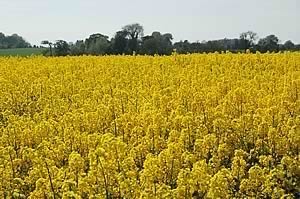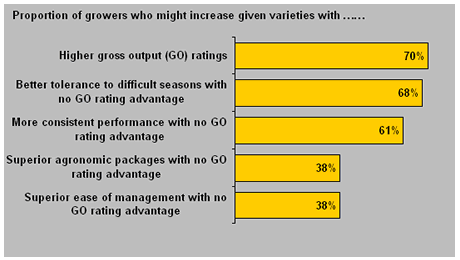 |
|||||||||
|
|||||||||||||||||||
|
|
Traditional Hybrid OSR Barriers Breaking Down 2010-07-26 Traditional barriers to the increasing uptake of hybrid oilseed rape across the UK appear to be breaking down as more growers come to appreciate the superiority of the best of today’s hybrid varieties in key areas of establishment vigour, ability to tolerate late sowing and spring growth.
To such an extent, indeed, that around two thirds of all growers – and over half of those with no hybrid growing experience whatsoever – could be persuaded to commit increasing areas of their cropping to hybrid varieties even in the absence of superior gross output ratings. These are among the interesting findings of the first-ever national hybrid oilseed rape study conducted independently on behalf of leading breeder, Dekalb with more than 230 growers responsible for over 15,000 ha of OSR across the UK this season. Of these, over two thirds have grown hybrids at some stage, the majority of them starting to do so within the past three years. Altogether, hybrid varieties comprised around 40% of the crop they harvested last season, with Excalibur dominating the acreage and delivering an average yield of 4.0 t/ha against the 3.8 t/ha average for the only other variety with a sufficient spread of crops and area to make meaningful comparisons – pure-line Castille. Perpetual slug and pigeon problems, increasing fertiliser costs and restrictions and increasing agrochemical costs are identified as the three most important challenges facing OSR growers today, with less reliable autumn conditions and growing disease threats also seen as important by many. “Against this background, it’s not surprising that establishment vigour, disease resistance/tolerance, standing power and performance consistency stand out as growers’ most An even more striking measure of the far more positive light in which growers are viewing hybrid OSR varieties today comes from the study’s assessment of future hybrid-growing interest. Figure 1: Willingness to Consider Increasing Hybrid Growing Nor is this willingness to be persuaded by hybrids merely confined to existing growers. Indeed, more than half of those who have never grown hybrids to date might be persuaded to do so in the absence of any gross output advantage by varieties showing more consistent performance or better tolerance of difficult seasons. “Given the way in which the best hybrids are currently valued by growers for their all-round vigour and tolerance of less-than-ideal growing conditions, these findings suggest hybrid growing is likely to become increasingly popular as a way of minimising commercial growing risks,” comments David Leaper.
|
||||||||||||||||||

|
|
||||||||||||||||||
| home | agri-services | pedigree
pen | news | dairy | beef | machinery property | organisations | site map |
|||||||||||||||||||



